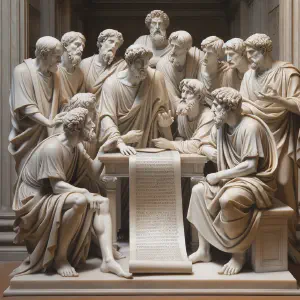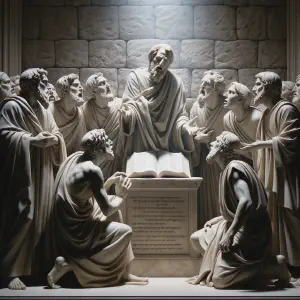The Journey of Faithful Stewards



The group set out, journeying far and wide, keeping the word of Christ at the heart of all they did. In each place they visited, they shared the Gospel with fervor and wisdom, navigating challenges with the shrewdness of the steward yet with the integrity of true followers of Christ. Their journey was not just a physical one, but a spiritual odyssey, deepening their understanding and love of God. Through their efforts, many who had never heard of Christ came to see and understand, fulfilling the prophecy and Paul’s aspiration, as new voices joined in singing the Lord’s new song of salvation.
Five Questions
What does Paul’s letter to the Romans tell us about our role in spreading the Gospel?
Paul’s letter emphasizes our collective responsibility to share the Gospel beyond our immediate circles, especially to those who haven’t heard of Christ. He underscores the importance of using our knowledge and goodness not just within our community but as instruments to bring others into the faith, exemplifying stewardship of God’s word.
How does the Psalm 98 complement Paul’s message in this context?
Psalm 98 echoes Paul’s message by celebrating God’s revelation to all nations. It calls for joyful praise and recognizes God’s mighty deeds and justice. The Psalm strengthens the idea of universal salvation and our duty to make God’s salvation known to every corner of the earth, aligning closely with Paul’s mission to the Gentiles.
What can we learn from the parable of the dishonest steward in Luke’s Gospel in relation to these scriptures?
The parable of the dishonest steward, though it speaks of a morally questionable action, teaches us about the importance of shrewdness and resourcefulness in our spiritual journey. It reminds us that, as stewards of God’s word, we must be wise and prudent in our approach to spreading the Gospel, using our resources and opportunities effectively to welcome others into God’s kingdom.
How do these passages guide us in our modern day mission work?
These passages encourage us to actively spread the Gospel with wisdom and prudence. They remind us that our mission is not just local but global, and that we must approach our evangelization efforts with a combination of shrewd resource management and a deep understanding of God’s word, ensuring that we reach as many as possible in a meaningful way.
In what ways do these scriptures reflect the fulfillment of prophecy?
These scriptures collectively point towards the fulfillment of the prophecy that all nations will come to know God. Paul’s mission to the Gentiles, the Psalm’s celebration of God’s salvation seen by all the earth, and the lessons from the Gospel all converge to show the unfolding of God’s plan for universal salvation, revealing that through our efforts in spreading the Gospel, we participate in the realization of this prophecy.
Bible Study
Romans 15:14-21
I myself am convinced about you, my brothers and sisters,
that you yourselves are full of goodness,
filled with all knowledge, and able to admonish one another.
But I have written to you rather boldly in some respects to remind you,
because of the grace given me by God
to be a minister of Christ Jesus to the Gentiles
in performing the priestly service of the Gospel of God,
so that the offering up of the Gentiles may be acceptable,
sanctified by the Holy Spirit.
In Christ Jesus, then, I have reason to boast in what pertains to God.
For I will not dare to speak of anything
except what Christ has accomplished through me
to lead the Gentiles to obedience by word and deed,
by the power of signs and wonders,
by the power of the Spirit of God,
so that from Jerusalem all the way around to Illyricum
I have finished preaching the Gospel of Christ.
Thus I aspire to proclaim the Gospel
not where Christ has already been named,
so that I do not build on another’s foundation,
but as it is written:Those who have never been told of him shall see,
and those who have never heard of him shall understand.
Paul, an apostle and a key figure in the spread of Christianity, addresses the Roman Christians. He acknowledges their inherent goodness and knowledge, urging them to admonish one another, highlighting the role of community in spiritual growth. This passage aligns with Catholic values of evangelization and the universal call to holiness, as seen in catechisms and the Great Commission. Paul’s mission to the Gentiles reflects the Church’s mission of inclusivity and outreach, emphasizing grace and the Holy Spirit’s role in sanctification.
Psalm 98
R. (see 2b) The Lord has revealed to the nations his saving power.
Sing to the LORD a new song,
for he has done wondrous deeds;
His right hand has won victory for him,
his holy arm.
R. The Lord has revealed to the nations his saving power.
The LORD has made his salvation known:
in the sight of the nations he has revealed his justice.
He has remembered his kindness and his faithfulness
toward the house of Israel.
R. The Lord has revealed to the nations his saving power.
All the ends of the earth have seen
the salvation by our God.
Sing joyfully to the LORD, all you lands;
break into song; sing praise.
R. The Lord has revealed to the nations his saving power.
Psalm 98, attributed to King David, a central figure in Jewish and Christian traditions, is a song of praise celebrating God’s mighty deeds and justice. It emphasizes the revelation of God’s salvation to all nations, resonating with the Catholic value of universal salvation. This Psalm aligns with the Church’s teaching on Divine Providence and God’s faithfulness, as outlined in the catechisms. It encourages acts of mercy through praise and recognition of God’s works, fostering a sense of global community united in witnessing God’s salvation.
Luke 16:1-8
Jesus said to his disciples, “A rich man had a steward
who was reported to him for squandering his property.
He summoned him and said,
‘What is this I hear about you?
Prepare a full account of your stewardship,
because you can no longer be my steward.’
The steward said to himself, ‘What shall I do,
now that my master is taking the position of steward away from me?
I am not strong enough to dig and I am ashamed to beg.
I know what I shall do so that,
when I am removed from the stewardship,
they may welcome me into their homes.’
He called in his master’s debtors one by one.
To the first he said, ‘How much do you owe my master?’
He replied, ‘One hundred measures of olive oil.’
He said to him, ‘Here is your promissory note.
Sit down and quickly write one for fifty.’
Then to another he said, ‘And you, how much do you owe?’
He replied, ‘One hundred measures of wheat.’
He said to him, ‘Here is your promissory note;
write one for eighty.’
And the master commended that dishonest steward for acting prudently.
For the children of this world
are more prudent in dealing with their own generation
than the children of light.”
This passage features a parable by Jesus, the central figure of Christianity, about a dishonest steward, demonstrating prudence in worldly affairs. The parable, while not directly endorsing the steward’s actions, teaches the importance of resourcefulness and foresight. This aligns with Catholic social teachings on the responsible stewardship of resources and the call to act wisely in our earthly responsibilities. The parable indirectly touches upon themes of repentance and mercy, key aspects of Catholic doctrine, encouraging believers to use their earthly life wisely in preparation for eternal life.
Lessons
These passages teach us about the importance of stewardship in our faith journey. Paul reminds us of our duty to share the Gospel, not only within our communities but also to the uninitiated. The Psalm reinforces the need to proclaim God’s salvation to all nations. The Gospel of Luke, through the parable of the dishonest steward, subtly instructs us on the prudent management of our given responsibilities, encouraging us to be as shrewd in our spiritual endeavors as we are in worldly affairs. Ultimately, these scriptures guide us in living a life that reflects Christ’s teachings, combining wisdom and faith in our mission to spread His word and bring salvation to the world.
Meditation Prayer


